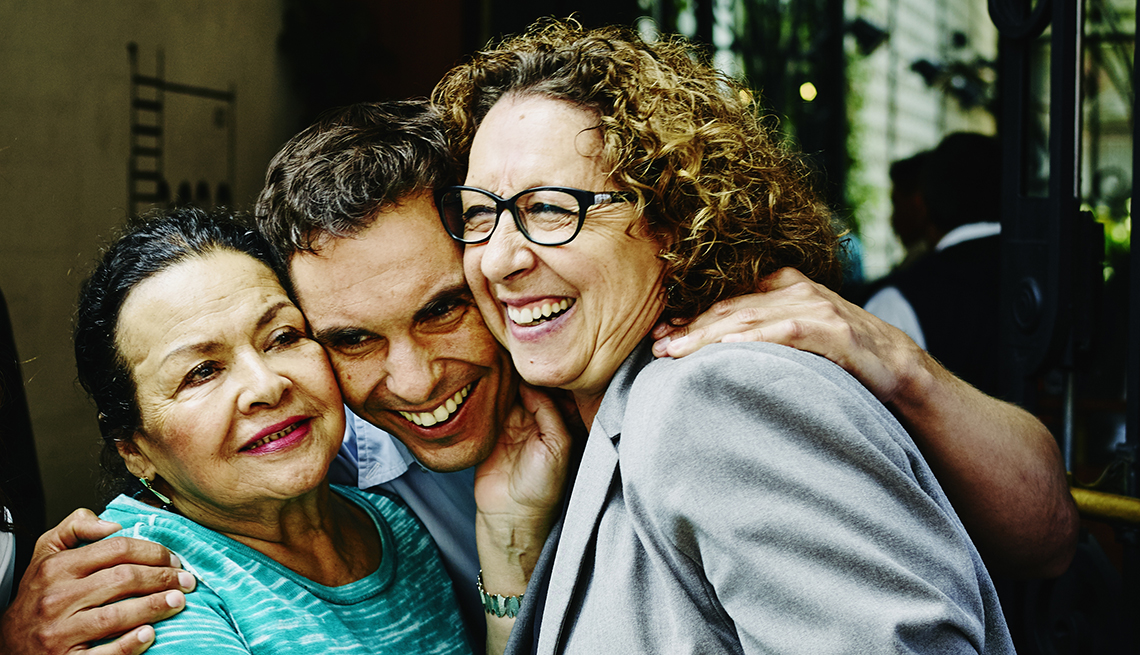Play all audios:
Hispanics have a range of concerns about the COVID-19 pandemic, according to a recent AARP survey. Respondents cited mental health, financial security, a coronavirus vaccine, and voting, but
they also said that family connections have helped sustain them through this difficult time. KEY FINDINGS A MAJORITY OF HISPANICS 35-PLUS SAY THEY OR SOMEONE THEY KNOW HAS CONTRACTED
COVID-19. * Almost six in ten (58%) Hispanics surveyed have experienced COVID-19 or know someone who has. Ten percent have had the virus in their household, and half (51%) know someone not
in their household who has had COVID-19, a substantially higher share than 36% of non-Hispanic adults surveyed. HISPANICS ARE CONCERNED ABOUT STAYING HEALTHY, SURVIVING ECONOMICALLY, AND
WHEN THE PANDEMIC WILL END. * Three-fourths of Hispanics surveyed are concerned about the impact of COVID-19 on the U.S. economy and having to deal with the pandemic beyond 2020. *
Two-thirds (68%) are concerned about themselves or someone in their family contracting COVID-19 and nearly as many are concerned about not surviving it (64%). * Nearly one in five (18%)
Hispanics surveyed have lost their job or were furloughed during the pandemic, and 26% have lost income. THE PANDEMIC HAS TAKEN A TOLL ON MENTAL HEALTH, ESPECIALLY FOR GEN X AND OLDER
MILLENNIAL HISPANICS. * The prevalence of COVID-19 among Hispanics together with the financial shocks and uncertainty have contributed to very widespread and deep feelings of stress and
worry. Large majorities report a range of negative emotions during the pandemic such as stress (79%), frustration (75%), lack of power/control (69%), anxiety (70%), fear (70%), and sadness
(71%). * Three-fourths of Hispanics surveyed say they have had difficulty dealing with the pandemic on a personal level. * Nearly every measure of self-reported emotional or mental health
indicates more stress among those ages 35–49 overall. Almost one in three (31%) are "extremely concerned" about the their own mental health or the mental health of others in their
families, and more than more than one in three (38%) report their mental health has worsened during the pandemic. FAMILY CONNECTIONS HAVE BEEN A PROTECTIVE FACTOR. * Connection to family has
been a sustaining factor during this time with 84% of Hispanic respondents feeling connected to family. FOR NOW, A VACCINE IS ONLY A HOPE UNTIL WE HAVE THE DATA AND BACKING OF EXPERTS. *
While a vaccine is expected to be available in the future, only a moderate share of Hispanics surveyed say they are likely to be vaccinated: 29% are “very likely,” and another 17% are
“somewhat likely.” One-fourth each are unlikely (26%) or unsure (28%). * The top three affecting the decision to get the vaccine are large scientific studies that show no side effects (48%),
proven effectiveness (46%), and FDA approval (40%). * Doctors and nurses are the most trusted sources of honest and factual information about COVID-19. MOST CONSIDER THE LATINO VOTE
IMPORTANT, BUT THERE ARE SOME SIGNS OF VOTER APATHY AND LAGGING PUBLIC TRUST IN U.S. DEMOCRATIC ELECTIONS. * A majority of respondents (55%) say the country is on the wrong track, and the
federal government's response to COVID-19 pandemic is largely seen as a failing: 48% say the U.S. government response has been poor or terrible and 32% give it an “okay” rating. * In
this context, a majority (58%) acknowledge that the presidential election is “extremely” important and (71% believe it is important that Latinos vote to make their voices heard. * At the
same time, nearly four in ten (39%) express concerns about fairness of the election in general, and one in three (36%) are concerned about potential violence after the election. With looming
uncertainty about election legitimacy, nearly one in four (23%) eligible Hispanic voters ages 35–49 say they either won’t vote (11%) or might not vote (12%). * In this chaotic election
year, a majority (55%) of Hispanic likely voters surveyed plan to vote either early in person (22%) or absentee by mail (33%). METHODOLOGY This survey of 1,000 Hispanic adults ages 35 and
older explored how people are coping with the COVID-19 pandemic, their attitudes about a possible COVID-19 vaccine, and their opinions about the 2020 presidential election. A sample of 350
non-Hispanic adults was also included for comparison. Interviews were conducted September 1–13, 2020.

